Jordan Ellis was not suited to school. “I couldn’t just sit there and concentrate. I had to mess about. I hate just sitting in the classroom working, listening to the teachers talk. I don’t like getting told what I have to do,” he says.
Ellis, 18, still has to follow instructions on his apprenticeship at Future Roots, a care farm in Dorset, but he’s free from the static confines of a classroom and has 30 acres to mess about in.
The pleasant smell of rain fills the air when I arrive at the farm on a muggy morning in August. I’m greeted by Future Root’s managing director, Julie Plumley, and her two dogs.
Plumley, 57, had the idea for Future Roots in 2008 after working with troubled children as a social worker. She recalls one visit to a local school as we trundle through muddy grass towards her duck pond. Plumley thought the children’s inability to keep still could have been put to good use on the farm she grew up on.
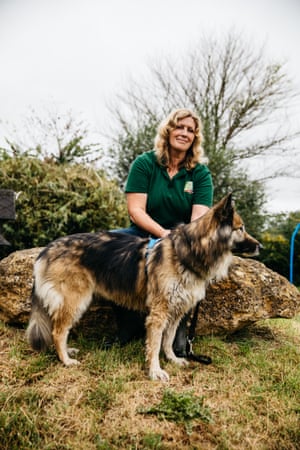
“Dad was my hero. So, he was never the best at anything. He was a dairy man, he fixed tractors, he was a builder, he was a plumber; whatever went wrong on the farm dad would just fix it,” she says. “And I was like: ‘God, the farm can teach you something that you might enjoy’.”
There are about 250 care farms operating in the UK. They typically offer farming-related activities including animal and plant husbandry, horticulture and land management. Increasingly GPs or community mental health workers can prescribe these farms as part of a care package. Future Roots, like other care farms, has a range of programmes that cater to people with learning difficulties, mental health issues and physical disabilities. It has managed to stay open throughout the pandemic and today is hosting two groups: the Countryman’s Club, a scheme that helps men over the age of 50, who often have degenerative conditions such as Parkinson’s disease, and the Future Farmers course for students aged 14-18. The course teaches basic literacy and numeracy and offers a City & Guilds award in land-based operations.
Plumley works with about 20 schools throughout Dorset and neighbouring Somerset and has a team of mentors who have backgrounds in social services, special education and occupational therapy. 70% of Future Root’s funding comes from local authorities and the schools who send their students to the farm. The remaining 30% comes from donations. She says that the kids who come to her are bright, just not academic. “If you speak to their teachers, they’ll tell you they’re aggressive, they’re angry, they’re into drugs, they’re antisocial.”
Despite their reputation, Plumley says she’s never had to exclude anyone from the farm and thousands have attended over the past decade. “The kids have said they walk on to this site and they feel safe – they feel that nobody’s going to trap them,” she says.
Many of the young people who come to the farm have dependency issues, live or have lived in the care system, and have been excluded from mainstream education. According to research by Bournemouth University, young people attending care farms “displayed a significant reduction in self-reported mental health risks and behavioural regulation difficulties; improved social relationships and coping; improved life and work skills; and re-engagement with learning”.
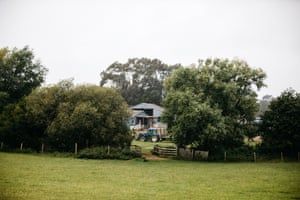
-
Future Roots is run by Julie Plumley (pictured above), and is among 250 care farms operating in the UK
Ellis has finished with the ducks and stops for a brief chat on the way to his next task. Why is the farm better than the classroom? “You’re out in the open, you’re doing stuff physically, working with people who are actually similar to me and got the same problems and their mind works the same,” he says.
Ellis admits he was a “pain in the arse” when he was younger and had a fiery temper. He took drugs and would rob people using knives. “That’s what happens when you mix with the wrong crowd and get into that mindset,” he says. Ellis is now keeping out of trouble and gets his kicks from tearing around the farm on a tractor.
Jaryn Taylor, who turned 17 the previous day, is working in the hay barn. “School messed me over bad,” he says, as we perch precariously halfway up a haystack at the barn’s entrance. “I’ve got learning difficulties, so I can’t read and write properly. They did nothing to help. So, I was messing up in all my lessons and I wasn’t learning anything.” Taylor would get frustrated at the lack of help and would abscond in the middle of lessons. “Basically, I’d tell them to fuck off, walk out and go home.”
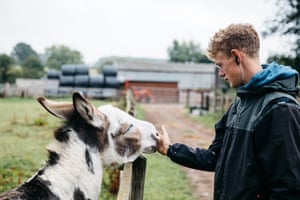
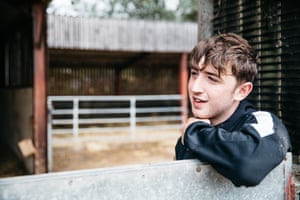
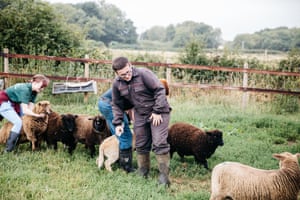

-
Future Roots apprentices tend to the animals – and take a tea break
Since coming to the farm three years ago, Taylor’s life looks radically different. He loves to drive the tractors and wants to own his own farm: “I used to hang around in this little group down in town. There’d be fights and I’d get involved and then I started coming here. I just realised I could do good for myself and just stay away from all of them.”
The rest of the group are attending to the stars of the farm, a herd of Simmentals – posh cows from Switzerland. Mo (not her real name), 17, was home schooled before she started here four years ago. She can match every calf in the field to its mother and has done the family trees of all the cows. When Mo arrived on the farm she was terrified of the cows and would not go near them. “It was nice to come here and out of the house. It’s helped my confidence a lot,” she says. “I’m a lot less anxious than I used to be. I wasn’t very social. I didn’t really see anyone.”
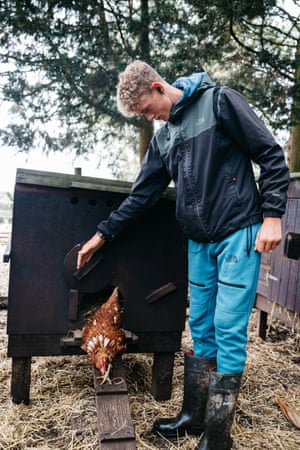
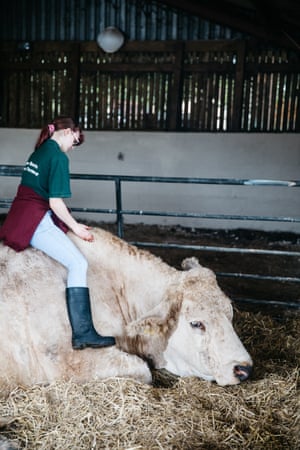
-
Left: Jordan Ellis lets a chicken out of its roost as part of his morning round. Right: when Mo, 17, first arrived she was terrified of the cows
Mo is excelling at her numeracy and literacy and has already completed the land management course. You’d expect a group of socially excluded teenagers to be carrying the weight of the world around with them. Guards up. Heads down. Constricted. But if the young people here were once burdened with such weight they must have left it at the entrance. All are glowing with enthusiasm for their work, for the animals. It probably helps that they have mentors who seem to encourage them, who champion them, who won’t condemn them for having a tizz when it all gets too much. They’re understood here and it shows.
But like all farms, Plumley’s is vulnerable to the potentially disastrous implications of the imminent trade deal with the EU. One of the prevailing fears is that cheap food imports and lower standards on agricultural products could destroy domestic farming. “I am afraid for farming being considered unnecessary in the future and [that] we will be totally reliant on other countries,” Plumley says.
The centrepiece of the latest agricultural bill is the Environmental Land Management scheme, where farmers can receive subsidies in exchange for meeting environmental standards. Plumley is not impressed: “It will decrease farming opportunities because landowners will keep land to get subsidies not to farm it. I really feel this is wealthy people rewarding themselves as they buy land.”
As we walk back to the hay barn we see Ken Barnes and Andy Pollard from the Countryman’s Club singing along to an acoustic rendition of Loch Lomond. Watching from the sidelines are their wives, Sue Barnes and Sue Pollard, who are about to get some well-earned respite from providing full-time care.
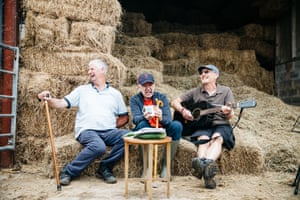
-
Ken Barnes, Andy Pollard and Nigel Spencer from the Countryman’s Club sing along to an acoustic rendition of Loch Lomond
Ken and Andy were both active ex-farmers and sportsmen. The farm provides them with an opportunity to reclaim part of their former selves. “I got his wellies out this morning and his face just lit up,” Pollard says. Before learning about the farm she says there wasn’t anything available that Andy wanted to do: “This is like a godsend here, you can’t believe the difference it makes. When he comes home after being here, we actually have a conversation.”
Barnes shares Pollard’s enthusiasm: “It took me quite a while to bring Ken here because he always had this thing about being with other people who had the same problems as him,” she says. But now her husband loves coming: “He doesn’t want to do anything else but farm. He’s always been like that. It gives me a break so when he comes here, I know he’s safe, I know he’s being looked after.”
It’s coming to the end of the day and a few of the Future Farmers are growing restless and have taken to chucking unripened apples around. We gather round in a circle in a shaded spot next to the chicken coops. All of them are past school-leaving age and today they’re deciding if they want to stay on at the farm. All are adamant they want to continue. Studying in classrooms with more than 30 pupils didn’t work for them. Some of them were bullied, while others struggled with the curriculum and acted up as a result, but the farm is working, and they only have to look to Ellis to see where it can take them.
Ellis is coming to the end of his apprenticeship and he’ll soon be able to earn more money and save up for the driving lessons he wants to take: “I can’t believe how much I’ve changed to be honest. I think it is this place. I’m out here every day, I don’t have time to do drugs or think of any of that crime stuff.”
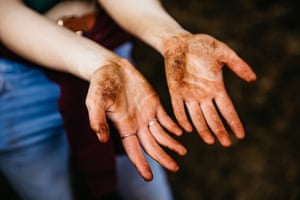
-
Mo shows how dirty her hands are after stroking a bull
Sign up for the Animals farmed monthly update to get a roundup of the best farming and food stories across the world and keep up with our investigations. You can send us your stories and thoughts at animalsfarmed@theguardian.com